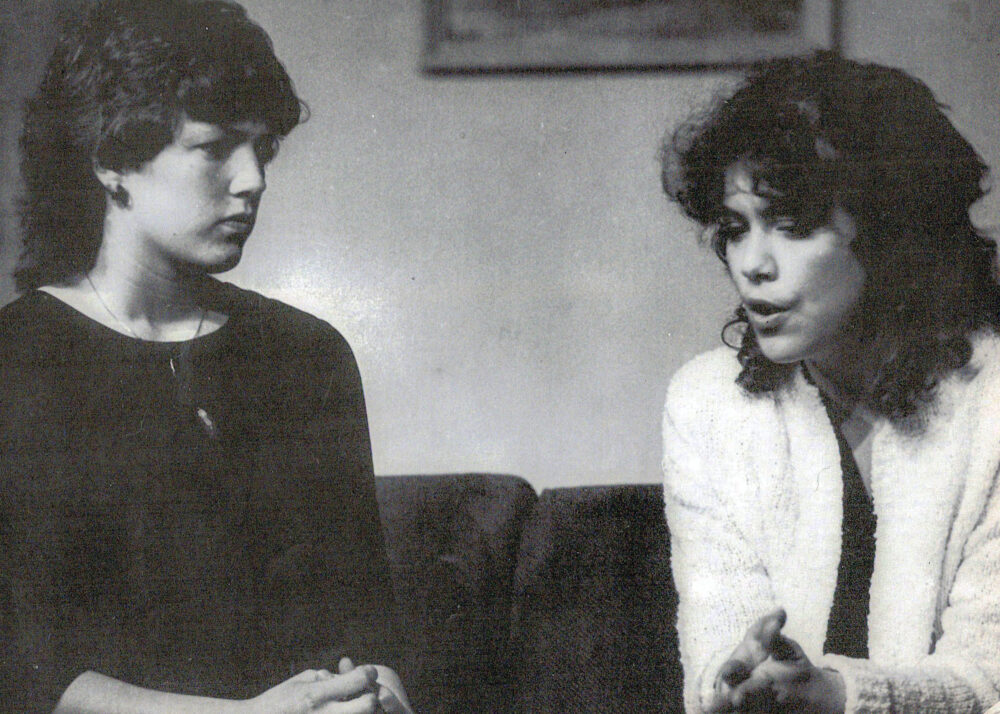The Children’s Hour Revisited
My Teenage Best Friend Brigid Louise Dunn Dalton Passed Away on August 8, 2023 • My high school Danyel nemesis returns after the death of our mutual best friend Brigid • I Originally Posted this September 11, 2023 on Social Media After Danyel Came to Visit Me • By Lesa Quale Ferguson
A few months ago, Cal and I waited for Bones at Canisius in the car lane. Our lone car, heavily used and rarely cleaned, had developed a musty, gym sock odor, seemingly reflecting my own feelings of being worn out. Just as the best part of the car had been used up in constant transit, I felt that the best part of me had been depleted, leaving the rest to perspire beneath the weight of daily life.
As we sat in the car, Cal began sharing what he was studying in social studies – JFK. Eager to encourage this, I suggested, “Let’s listen to a podcast called ‘Presidential.’ I’ve never heard the one on JFK before.” Despite Cal’s protests, pushing for a goofy and inappropriate song about money called “Jiggle, Jiggle,” I turned up the volume on the JFK podcast. The name of the expert jolted my memory. The long dormant image of my old nemesis was resurrected through the voice of her husband, Fred – a Swedish historian, Harvard professor, Pulitzer Prize winner, JFK scholar, and the high school sweetheart of none other than Danyel Meyer.
As with any “firsts” in your life, your first nemesis is important. She was epic in my personal narrative, made more so by the fact that in our senior year of high school, she was cast opposite me in our high school’s production of “The Children’s Hour.” In this play, I portrayed Martha, who professed her love for her character’s best friend, Karen, before tragically ending her own life out of shame. I had vigorously campaigned to perform this play, hoping to secure the role of the little girl Mary, known for spreading lies about her teachers. This preference was influenced by the presence of secrets and lies in my own family. I understood the play’s message that the truth will have its due. I was a fan of playwright Lillian Hellman, particularly Jane Fonda’s portrayal of her in “Julia.” If vision boards were a thing when I was a kid, I would have pinned a picture of Jane Fonda furiously writing and smoking over a typewriter, while her lover, a rugged Jason Robards as Dashiell Hammett, crafted mysteries in some coastal cottage while the world speculated about her relationship with fascist fighting best friend Julia.
Furthermore, this was a play entirely centered on women, with the two males having dribs and drabs for lines. It was the complete opposite of most other plays. When our drama teacher, Mr. Merryman, assigned me the role of the suicidal lesbian Martha instead of Mary, he candidly mentioned that my significant physical maturity might make it challenging for the audience to believe me as the child. I retorted, “But Mr. Merryman, I could bind my chest.” To which he countered, “And what about your hips?”
I accepted the role of Martha. Growing up in a town like Ashland, Oregon, where LGBTQ+ individuals I knew were mainly artists, I didn’t care If others speculated about my sexuality. It added a touch of mystery and allure, didn’t it? I believed that a bold performance challenging my sexuality would only boost my appeal, much like Chrissie Hynde in that iconic red leather biker jacket on the Pretenders album cover.
However, as I embraced this role, Brigid resented it. No matter how much I pictured her as a fearless Vanessa Redgrave, fighting fascism on my mental vision board, it seemed that her ideal was more akin to Karen Carpenter. She wanted to be wanted like the girl in a love song, the one all the boys lusted and longed for. To complicate matters further, her mother, a vocal activist in town, had publicly come out the year before.
My role as a lesbian opposite her childhood bestie Danyel Meyer turned into quite the ordeal. For Brigid, LGBTQ+ meant something far more complicated and challenging. She couldn’t distance herself from me fast enough, and we didn’t speak until after the production concluded.
Despite this, I decided to seize this chance to confront my nemesis. I invited my new scene partner to my version of HQ, the Batcave, Hall of Justice, aka the restaurant Geppetos, for coffee and cheese wontons and a showdown. I explained to her that, as actresses, we needed to reconcile our relationship to realistically portray best friends. I shared some of the reasons she had become my nemesis. As far as I can recall, I laid it all out: how the boy I was obsessed with liked her more; how some of my dearest friends, Brigid and Cooper, liked her more; how it seemed like everyone I liked, liked her more; how her dad was the town’s costume designer (owning Arty Shirts) while mine had left without a word; how she had a boyfriend who adored her while I struggled to talk to boys I liked; how I was probably just as intelligent as she was, but she made the honor roll while I couldn’t even get to school on time; how she exuded confidence, purity, and happiness while I felt like Eeyore stranded up a creek without my tail. I let my resentments unfurl. How could we possibly portray best friends when this was the case?
Her reaction was utterly underwhelming.
Anticlimactic.
She responded with kindness and understanding.
To her, I was merely another of Brigid’s friends, another girl in our drama class, someone she had occasionally hung out with at the Sweet Shoppe. “Didn’t we play volleyball together in junior high?”
Yep, the whole interaction had me understanding why I might off myself. While I stayed in high dudgeon, Danyel remained in “goodly spirits.” This pattern would repeat throughout my life: I yearned to hold more significance to people who mattered to me, even if they were my nemeses. It’s tough being the one consumed by overwhelming emotions. If I didn’t know any better, I might have suspected she was manipulating me into fully embracing the role, but emotional manipulation was certainly not Danyel Meyer’s forte. Danyel was kind, considerate, friendly, introspective, and sincere. She was the perfect embodiment of Karen, and simply by being herself, she had her Martha – someone who was deeply ashamed of how much she felt.
Danyel superpower was something neither Brigid nor I possessed. Danyel had no interest in becoming someone else or changing who she was, certainly not a vision board fantasy, not Karen Carpenter, or Chrissie Hynde. She wasn’t on a quest for desirability like so many of us. It was likely that the only class Danyel Meyer ever skipped in school was the one where they tried to teach us girls that we needed to be desirable.
Back then, being desirable was a must for teenage girls, just like saying the Pledge of Allegiance. We either pursued it aggressively or tried to evade it altogether. While some succeeded to varying degrees, the real issue was how it fueled our insecurities. Desirability was subjective, and anyone can reject you, and this fear of rejection often prevented us from understanding our true desires.
Brigid and I were clueless about what we desired. Did we desire men, women, each other, or the moon? Danyel, on the other hand, seemed to gracefully sidestep the mandate. She knew precisely what she desired: a certain guy, a particular play or sport, a connection with God, a special friend, and a fulfilling life. With an air of grace and kindness, she confidently pursued her heart’s true desires.
She won the drama scholarship that year, while I gnashed my teeth over it…for years. I suppose her quiet self-assurance and hard work had won over Mr. Merryman too.
Back in my malodorous car with Cal, I chanced upon another interview with Danyel’s husband, where he talked about his early career, following Danyel’s educational pursuits across North America. Whenever he spoke of her, his voice turned velvety smooth, as if he were crooning about his girl in a love song, just as Brigid, Cooper, and even Mr. Merryman talked about her. Fred remained as infatuated with her now as he had been when she was just fifteen.
Nemesis!
If I had actually ended up with the guy I was infatuated with back when I was 15, it might have led to some lethal situation, like baking him an arsenic-laced apple pie. Seriously. He turned out to be so mean.
It’s only been 40 years and a couple of podcasts for me to finally figure out what Danyel Meyer was laying down: You can become desirable to the right people by pursuing your own desires. Desire begets desire.
I hit the stop button on the podcast and played “Jiggle, Jiggle” for Cal. “Five feet two, in a compact car, no wiggle room, but fortunately, the seats recline, and I’ve mastered the art of relaxation in my own mind.”
I didn’t think about this moment again, until I learned that Brigid passed away. A week or so after I found out, I received a text from an unknown number. It was Danyel, expressing her desire to come to Buffalo from Boston so we could mourn our friend together.
On the day she arrived, I drove her from the airport to a restaurant in my less-stinky-but-still-stinky car. Thankfully, now that we have two cars, I had the time to clean up or toss out whatever was causing that unpleasant odor under the seats. We sat at Liberty Hound, outdoors by the water, for three hours, engaged in uninterrupted conversation until Dana, another of Brigid’s besties, joined us. For a girl who was desperate to be desired by boys, Brigid Dunn Dalton enjoyed a cadre of best girlfriends. We continued chatting for another two hours.
I couldn’t help but think how much Brigid would have disliked this situation, just as she despised the idea of us being in a play together. Her insecurities persisted until the end. This made me wonder how different the world might be if more girls were like Danyel—secure, confident, and attuned to their own desires and curiosity.
For me, I see now how Danyel was a way to externalize the struggle within. Turns out I had a marvelous nemesis, one worthy of my internal conflict.
At lunch, Danyel and I were so engrossed in our conversation that we forgot to take pictures. But if you were to take this photo and imagine Danyel’s hair a bit grayer and me plumper, and if you don’t look too closely, it would be quite accurate. The years had treated us more kindly than they had Brigid, and in that moment, a subtle sense of regret washed over us about how little we were involved with Brigid in the end. Just like in the past, we each navigated away from her and into the drama of our own lives. Danyel is still moving forward thoughtfully, while I continue to try to hatch whatever is under the seat of my car.
Our personal dramas are like ever-evolving stories, with chapters that unfold as we explore the perspectives and plotlines of other characters. Sometimes, those first chapters resonate all the way to the end.
RIP Brigid, our story is far from over.
Photo Credit: Debra Liebowitz
The fact that Deb was taking pictures of this production adds a whole other layer to this story but that’s a post for a different day.

More Writing by Lesa Quale Ferguson
about author

Writer + Picture Taker ^ Image-Maker & Design Web-ber #Ma
I don't have a newsletter YET!
I will be inspired to write one if I get enough email addresses.



